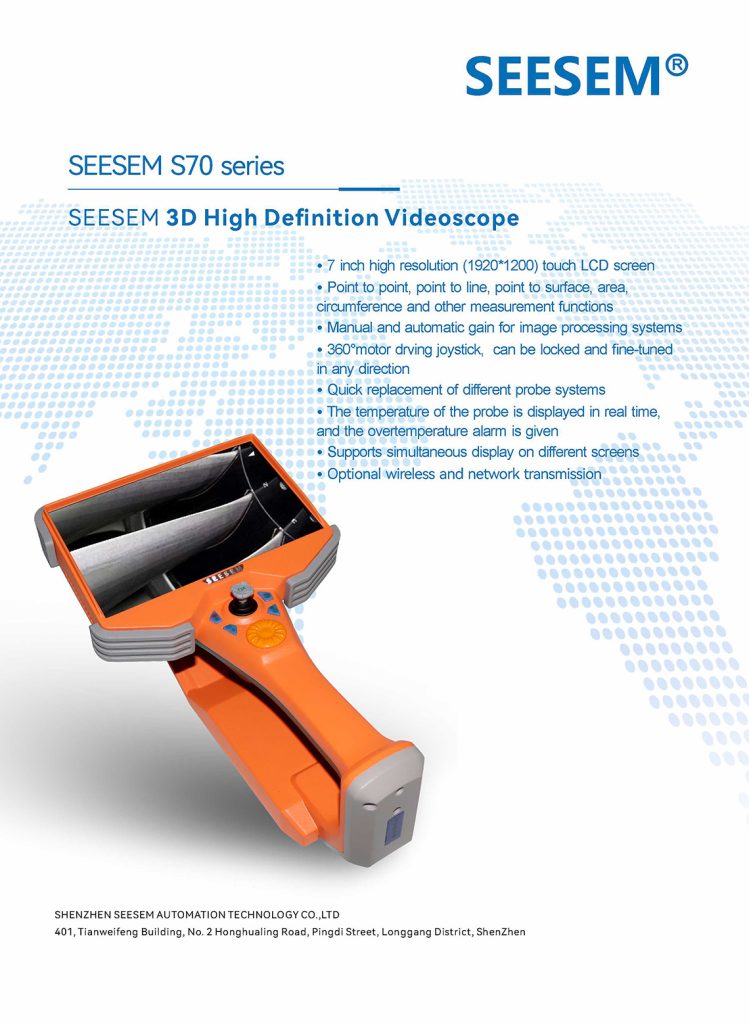Nel campo dell'ispezione e della manutenzione industriale, I videoscopi industriali emergono come strumenti indispensabili, rivoluzionando il modo in cui percepiamo e affrontiamo le sfide all’interno di macchinari e strutture complesse. Grazie al loro design flessibile e alle funzionalità di imaging ad alta risoluzione, questi dispositivi avanzati offrono comodità ed efficienza senza pari in un'ampia gamma di applicazioni industriali. Questo articolo esplora le principali applicazioni dei videoscopi industriali nel panorama industriale.
1. Prove non distruttive (NDT):
In prima linea nelle applicazioni del videoscopio industriale risiede il suo ruolo fondamentale nei controlli non distruttivi (NDT). Introducendo i videoscopi in aree difficili da raggiungere, ingegneri e tecnici possono condurre esami in tempo reale delle condizioni interne senza la necessità di smontaggio o danni. Questo approccio non invasivo non solo aiuta a identificare potenziali problemi, ma riduce anche al minimo i tempi di inattività, rendendolo un metodo preferito per garantire l'integrità strutturale.
2. Manutenzione e controllo qualità:
I videoscopi industriali rappresentano una risorsa inestimabile nei processi di manutenzione ordinaria e di controllo qualità. Questi dispositivi consentono ai professionisti di ispezionare visivamente i componenti, saldature, e parti complesse di macchinari per segni di usura, corrosione, o altri difetti. Facilitando l’identificazione proattiva di potenziali problemi, i videoscopi contribuiscono a una maggiore affidabilità, tempi di fermo ridotti, e nel complesso una migliore efficienza operativa.
3. Industria aerospaziale:
Nel settore aerospaziale, dove precisione e sicurezza sono fondamentali, I videoscopi industriali trovano ampio utilizzo. Gli ingegneri utilizzano i videoscopi per esaminare i motori degli aerei, ispezionare le pale della turbina, e valutare i componenti critici senza la necessità di smontaggio. Ciò non solo garantisce la sicurezza dei viaggi aerei, ma supporta anche la longevità e le prestazioni ottimali delle apparecchiature aerospaziali.
4. Produzione automobilistica:
L'industria automobilistica trae notevoli vantaggi dall'applicazione dei videoscopi industriali durante i processi di produzione e assemblaggio. Dall'ispezione dei componenti del motore e dei sistemi di alimentazione all'esame delle saldature e alla convalida dell'integrità delle strutture interne, i videoscopi svolgono un ruolo cruciale nel mantenimento degli elevati standard di qualità e sicurezza sinonimo del settore automobilistico.
5. Esplorazione di petrolio e gas:
Negli ambienti difficili dell’esplorazione di petrolio e gas, I videoscopi industriali consentono l'ispezione delle tubazioni, pozzi, e altre infrastrutture critiche. La loro flessibilità e il design robusto consentono esami approfonditi in condizioni remote e difficili, garantire il rilevamento tempestivo della corrosione, perdite, o problemi strutturali che potrebbero compromettere l’integrità dell’intero sistema.
Conclusione:
I videoscopi industriali sono emersi come strumenti indispensabili in diversi settori industriali, offrendo un'azione non distruttiva, efficiente, e mezzi precisi per ispezionare e mantenere le infrastrutture critiche. Mentre la tecnologia continua ad avanzare, è probabile che le capacità dei videoscopi si espandano, rafforzando ulteriormente il loro ruolo nel garantire la sicurezza, affidabilità, e la longevità dei sistemi industriali in tutto il mondo.


